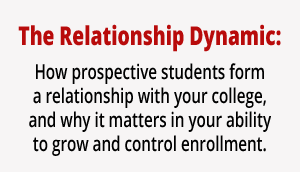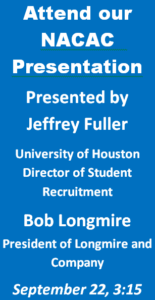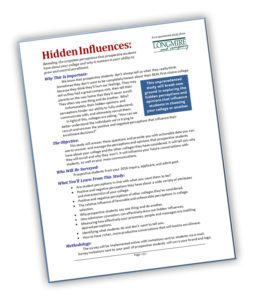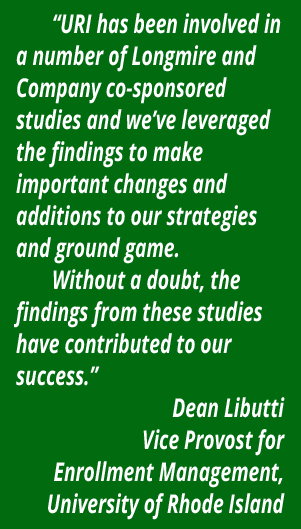We just returned from Columbus where we teamed up with Jeff Fuller, University of Houston Director of Student Recruitment, to present the results of our nationally co-sponsored study, “The Relationship Dynamic,” to an enthusiastic crowd of enrollment professionals at the NACAC Conference. NACAC’16 drew thousands of participants and I suspect that most returned home feeling like our team; newly energized and proud to be part of the profession of college admissions.
Conference. NACAC’16 drew thousands of participants and I suspect that most returned home feeling like our team; newly energized and proud to be part of the profession of college admissions.
“The Relationship Dynamic” defines specific actions colleges can take to build stronger relationships with prospective students that will lead to enrollments and it was great to be able to share those with the 500+ admission professionals that attended our presentation. Often, the most constructive part of any presentation comes from the questions asked by the participants and we want to share some of the best Q&A’s to share with you.
Q: “We have a huge volume of prospective students in our pool. How can I determine if we have “moved the needle” with individual students when it’s impossible to talk to all of them individually?”
A: “Build a feedback loop into every channel you use to communicate with prospective students. For instance, when you send an email include a link to a one question survey that finds out if they are more or less excited about your college, if they plan to take a particular action, or some other indicator that tells you if you are, or aren’t, moving their needle.”
Q: “You recommend recruiting parents much like we do students. At our college, we are often trying to separate parents from the student so they don’t dominate the conversation. Are we wrong to do that?”
A: “We recommend creating a separate track for parents, assuming both the parent and student agree that it’s OK. Find out what a parent wants and how they’re going to arrive at their college choice independent of the students. We know that parents are influencers but the Relationship Dynamic study shows just how much they are facilitators. We need to enable them.”
Q: “We do a lot of texting campaigns but your data shows only 16% of students say texts played a significant role in building a relationship with the college. Should we abandon texting as a recruiting tool?”
A: “Absolutely not. However, you can give your text communications far more impact when you make them personal and relevant to the individual student’s interest. Use the data and info you have about the student to personalize it and make it compelling. The technology available to you these days makes that possible.”
Q: “The study shows that contact frequency has much less influence on building a relationship than contact relevance. How do you uncover what is relevant and how do you leverage that information?”
A: “If it’s possible to have conversations with each of your prospective students then use those to explore the issues that are relevant to them. I’m talking about asking a diverse and penetrating set of questions much deeper than “what do you want to study?” Once you’ve gained an understanding of the student’s motivations, interests and fears, the info must be recorded in a CRM or other data warehouse where you can pull it to drive future communications.
If you are one of the many colleges who have enormous pools of prospective students making it impossible to have individual conversations, we advise you to ask for feedback and information from students with each and every communication. Make it a two-way instead of a one-way flow of information.
It can be done. For many years, we’ve been uncovering students’ needs, preferences, fears, plans and motivations without talking to them face-to-face. The information you gather should then drive your messaging through each and every communications channel.”
Q: “Are you still signing up co-sponsors for your current co-sponsored study [he is referring to our study currently underway called “Hidden Influences”] ? Can colleges still get in on it?”
A: “Yes and yes. [Click here for full details.] This study is doing a deep dive into uncovering the things students hold back from colleges during the college shopping process and, more importantly, the findings will provide colleges with strategies and methods to uncover hidden influences and deal with them before the student solidifies his or her enrollment decision. We welcome all colleges to participate.”
Want to see the full “Relationship Dynamic” report? Click here for an instant download.
There are communication techniques your staff can learn that will help them feel confident about reaching out to prospective students to ask the right questions. This is one of the core techniques we teach in the Interactive Counselor Training Workshops we hold on college campuses throughout the country. It is also a key component of YES, our Yield Enhancement Tool. Let me show you how we can help you. Please call or email me for more information. Continue the conversation on Twitter @LongmireCo. Be sure to Subscribe to Versions of Conversion today so you don’t miss any of this highly-valuable information.
 Rick Montgomery is as an Enrollment Strategist at Longmire and Company. With over 20 years in higher education marketing, he brings an innovative and dynamic approach to helping colleges and universities meet their enrollment goals. Rick can be reached at 913/492.1265 x.708 or via email at rmontgomery@longmire-co.com.
Rick Montgomery is as an Enrollment Strategist at Longmire and Company. With over 20 years in higher education marketing, he brings an innovative and dynamic approach to helping colleges and universities meet their enrollment goals. Rick can be reached at 913/492.1265 x.708 or via email at rmontgomery@longmire-co.com.
 All over the country, college reps are contacting high school counselors, hosting meet & greets with college-bound seniors, presenting at college fairs, pulling together promotional materials and visiting 100+ high schools in way too few days. For admission counselors, it is Travel Season and it can be stressful and relentless. But, is it productive?
All over the country, college reps are contacting high school counselors, hosting meet & greets with college-bound seniors, presenting at college fairs, pulling together promotional materials and visiting 100+ high schools in way too few days. For admission counselors, it is Travel Season and it can be stressful and relentless. But, is it productive? students who are now enjoying college life at your school. Offer specific examples of students from all walks of life who have flourished in their new college environment.
students who are now enjoying college life at your school. Offer specific examples of students from all walks of life who have flourished in their new college environment.




